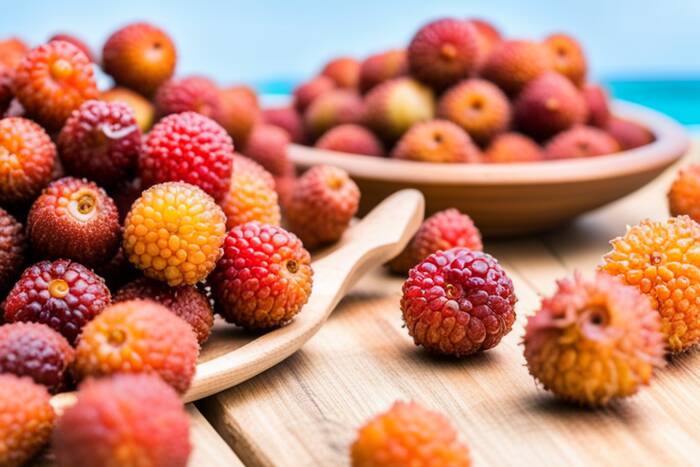Is lichi good for diabetes? Explore the implications of litchi consumption for individuals living with diabetes. Find insights into personalized diet plans and diabetes management programs.

The delectably sweet and tangy fruit we all cherish – can you guess what it is? It’s lychee! Most of us relish this delightful fruit, but if you have diabetes, you might be curious about its safety.
If or if not you can include it in your diabetes care plan. Let’s explore together!
Unveiling Lychee’s Nutritional Riches
Lychee, a small fruit, holds a rich reservoir of nutrients like vitamin C, potassium, and antioxidants.
Regardless of diabetes status, these nutrients contribute to our overall health. Nonetheless, a question persists: Is it fitting for individuals with diabetes?
Navigating the Sweetness Aspect
Litchi’s natural sweetness corresponds to sugar content.
Yet, fear not, for the glycemic index (GI) offers insights into how foods impact blood sugar.
The GI gauges the speed at which specific foods elevate blood sugar levels. Lychee holds a moderate GI, indicating that its consumption in modest portions doesn’t cause drastic fluctuations in blood glucose.
Litchi for Diabetes-Friendly Merits

Let’s now explore the favorable attributes of lychee for individuals with diabetes:
Dietary Fiber: Lychee contains fiber, a boon for digestion and stable blood sugar. Fiber retards sugar absorption, preventing abrupt spikes in glucose levels.
Antioxidant Richness: Lychee’s abundance in antioxidants [1] safeguards our cells against damage caused by harmful molecules known as free radicals. These antioxidants function as protectors, fortifying our bodies’ health.
Hydration Assistance: Lychee’s high water content aids hydration, particularly on scorching days. Adequate hydration is vital for overall wellness, and lychee lends a helping hand.
Mastering the Art of Moderation
While lychee imparts health benefits, it’s crucial to recognize that excessive consumption of any sugary fruit can impact blood sugar.
Although lychee’s GI is moderate, prudence in portion control remains pivotal. Striking a balance and avoiding overindulgence are fundamental principles.
Collaboration with Healthcare Professionals
For those managing diabetes, collaborating with healthcare professionals, including dietitians, is paramount. They can tailor a personalized meal plan catering to individual requirements.
A balanced diet that encompasses diverse food choices is instrumental in effective diabetes management.
Embrace Lychee in Moderation
Yes, it is safe for diabetics to eat litchis, but within reasonable bounds and as part of a balanced diet. Exercise prudence in portion sizes and opt for fresh lychee whenever possible.
Instead of overconsuming, relish the flavor of lychee mindfully. With a thoughtful approach, you can relish lychee’s innate sweetness without apprehension.
FAQs:
How many lychees can a diabetic eat?
The amount of lychees a diabetic can eat depends on their personal carbohydrate limits and should be discussed with a doctor or dietitian to keep blood sugar in check. In general, you can have 1-2 lychees safely.
Does lychee have added sugar?
No, lychee does not have added sugar; its sweetness comes from natural sugars. However, its processed forms like canned lychee or lychee syrup may contain added sugars.
What is litchi good for?
Litchi is good for providing essential vitamins and minerals including vitamin C and potassium as well as antioxidants which can support overall health and boost the immune system.
Is litchi hot or cold?
Litchi is typically considered a “cold” or cooling fruit in traditional Chinese medicine[2] and Ayurveda due to its refreshing and hydrating properties.
What is the side effect of litchi?
In certain regions children experienced brain inflammation following the consumption of lychee fruit which has been attributed to hypoglycin A a substance found in lychees that can lead to decreased blood sugar levels resulting in hypoglycemia.
The Bottom Line
To conclude, lychee can be enjoyed in moderation by people with diabetes and can be seamlessly integrated into a diabetes-friendly diet.
It furnishes vital nutrients, fiber, and antioxidants that bolster overall well-being. Collaborate with healthcare professionals to forge a meal plan aligned with individual needs.
Armed with the right approach, you can relish the exquisite taste of lychee worry-free. Remain hale and joyful, and savor lychee’s innate sweetness with a smile!

Lifebing is driven by an unrelenting passion for promoting health and well-being, our team is wholly committed to curating exceptional content and immersive experiences.
